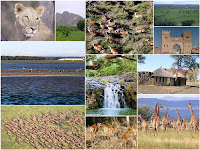Lions could become extinct!
This is very unnerving: lions are disappearing fast, and if nothing is done immediately to reverse this, experts predict that - lions could be wiped out from the wild in ten years. It is hard to imagine this let alone accept it. For a number of years now, we are being warned on the precarious numbers of this most majestic of animals:
Do we need to save lions? It is all about survival and life here on Earth. The more creatures become endangered or extinct, the more, we Mankind are in danger;...the loss of a top predator such as the lion can cause ecological changes. And without them, scientists lose any chance of understanding how all of the species in the ecosystem might normally interact. We can still save lions. There are several ways you can help make a difference: read the eight ways to save them; or support conserving lions in - Mara, Laikipia, Amboseli and around the Kilimanjaro; or donate and you can help save a big cat and ensure the Earth is not without these majestic creatures. Or: support Save the Lions on Facebook.
Lions may soon become extinct in large parts of Africa. According to a commission set up under the auspices of the World Conservation Union (IUCN), there is not a single population of lions in West or Central Africa that is large enough to be viable. New Scientist ~ November, 2001
According to wildlife experts, there are now only 23,000 lions left in Africa. That compares with over 200,000 in the 1980's, and if the populations continue to fall, experts predict lions will soon become extinct.......a wildlife biologist from the University of California, said the only way to save lions and other predators is to learn how humans and the animals can live together. Animal Planet ~ October, 2003
Lions in East-Africa are being poisoned by a pesticide that is banned in the European Union and will probably soon be banned in the US for all food crops. It's called Carbofuran and it's used to "control insects and other pests on crops such as corn, rice and sorghum". Unfortunately, it's also used to poison lions... Trehugger ~ March, 2009
It is the world's most iconic animal. The stuff of childhood nursery rhymes. The inspiration for many of humankind's most enduring myths. A purveyor of legends and, for those unlucky enough to be caught in its claws, the harbinger of nightmares. The lion is a circus performer, the star attraction at the local zoo and a must-see attraction of any safari to Africa. Its likeness appears on crests, on coats-of-arms, outside many of the world's law courts and on many of the world's currencies. And now, according to the two world-renowned researchers and wildlife filmmakers who have made big-cat conservation their life's calling, the lion is in serious danger of disappearing from the wild. Leader-Post ~ February, 2011
Lions are dying off rapidly across Africa. These cats once ranged across the continent and into Syria, Israel, Iraq, Pakistan, Iran, and even northwest India; 2,000 years ago more than a million lions roamed the Earth. Since the 1940s, when lions numbered an estimated 400,000, lion populations have blinked out across the continent. Now they may total as few as 20,000 animals. Scientists connect the drastic decreases in many cases to burgeoning human populations. Big Cats Initiative ~ NowAlarm bells have been regularly ringing on the fate of the King of the Wild. It seems no one is heeding these calls, and nothing is being done. Anyone who visits game and wildlife parks and reserves regularly, will have noticed that - lions in the wild, are becoming more and more rarer. For instance, forty years ago: in Kenya, while traveling from the Coast to Nairobi or from Nairobi to Tanzania, you could easily see these imposing animals; in Uganda, lions, especially at nights, would be crossing roads or would be there by the roadsides near places like Mbarara, Kasese and even Soroti; and in Tanzania, then, they seem to be everywhere. Now, you can hardly find lions on the roadsides anymore. Even while visiting most game parks or reserves where they were abundant before, you can hardly see any lions.
Do we need to save lions? It is all about survival and life here on Earth. The more creatures become endangered or extinct, the more, we Mankind are in danger;...the loss of a top predator such as the lion can cause ecological changes. And without them, scientists lose any chance of understanding how all of the species in the ecosystem might normally interact. We can still save lions. There are several ways you can help make a difference: read the eight ways to save them; or support conserving lions in - Mara, Laikipia, Amboseli and around the Kilimanjaro; or donate and you can help save a big cat and ensure the Earth is not without these majestic creatures. Or: support Save the Lions on Facebook.


